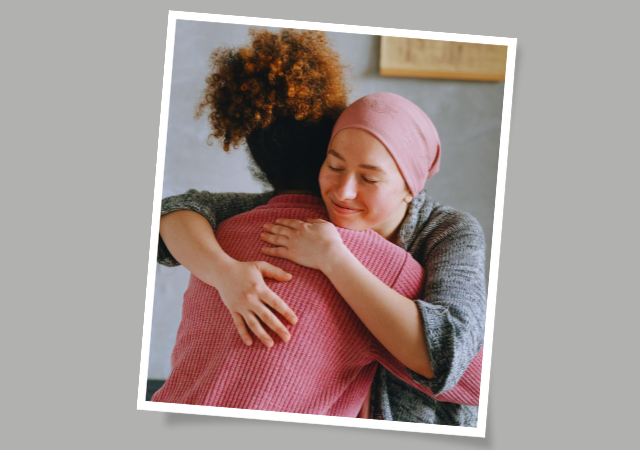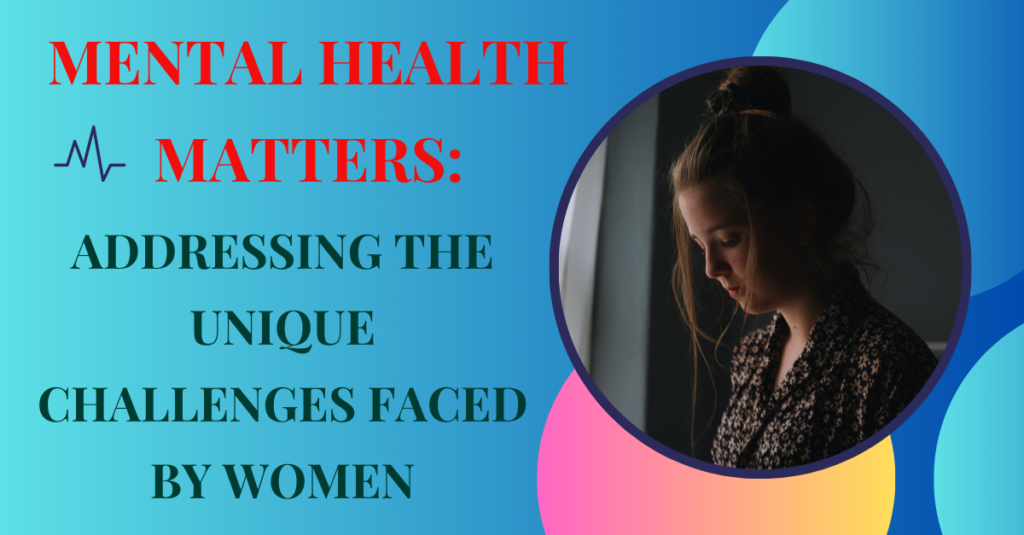Mental Health Matters: Addressing the Unique Challenges Faced by Women
Introduction
In the vast and evolving landscape of mental health, it is imperative to recognize and address the distinctive challenges faced by women. Mental health is a deeply personal journey influenced by a myriad of factors, and women experience this journey in ways that are both unique and complex. This article aims to shed light on the intersection of biological, societal, and cultural aspects that shape women’s mental well-being, unveiling the specific challenges they encounter throughout various stages of life.
Mental Health Matters: Addressing the Unique Challenges Faced by Women
Gender and Mental Health

To comprehend the intricate relationship between gender and mental health, one must navigate through societal expectations and stereotypes that play a pivotal role in shaping the experiences of women. From a young age, societal norms dictate what is deemed acceptable for women, impacting self-perception and influencing mental well-being. The pressures to conform to idealized beauty standards, excel in both personal and professional spheres, and fulfill traditional roles can contribute to heightened stress and anxiety.
Moreover, biological factors add another layer to the gendered nature of mental health. Hormonal fluctuations throughout a woman’s life, from puberty to pregnancy to menopause, can significantly impact mental well-being. The hormonal roller coaster, often dismissed or misunderstood, underscores the need for tailored approaches in addressing women’s mental health.
Unique Challenges Faced by Women
Life Transitions
Life transitions inherently bring about challenges, and women undergo several unique ones that can profoundly affect mental health.
- Puberty and Adolescence: Navigating the complexities of adolescence is a universal challenge, but for girls, it often involves additional pressures related to body image and societal expectations. The hormonal changes during puberty, coupled with societal ideals of beauty, can contribute to self-esteem issues and the development of mental health concerns.
- Pregnancy and Postpartum Period: The journey into motherhood is transformative, yet it comes with its set of challenges. Pregnancy-related hormonal changes, coupled with the emotional demands of motherhood, can lead to conditions such as postpartum depression. The lack of awareness and support during this critical period exacerbates the mental health struggles women face.
- Menopause: The transition into menopause represents a significant life stage for women, marked by hormonal fluctuations and physical changes. These changes can contribute to mood swings, anxiety, and depression. The societal silence surrounding menopause often leaves women feeling isolated in their struggles.
Societal Pressures
- Body Image and Societal Standards: The perpetuation of unrealistic beauty standards in the media and society can have detrimental effects on women’s mental health. The pressure to conform to these ideals often leads to body dissatisfaction, contributing to conditions such as eating disorders and depression.
- Work-Life Balance: Balancing career aspirations with family responsibilities remains a constant challenge for many women. The societal expectations of ‘having it all’ can lead to stress, burnout, and mental health issues. The struggle to meet professional demands while fulfilling familial roles often goes unrecognized, amplifying the mental health toll.
Trauma and Violence
- Domestic Violence: Domestic violence is a pervasive issue affecting countless women globally. The trauma inflicted by domestic abuse can result in long-lasting psychological consequences, including anxiety, depression, and post-traumatic stress disorder (PTSD). Overcoming the stigma associated with reporting abuse is a critical step in addressing mental health in these situations.
- Sexual Assault: Women who have experienced sexual assault often grapple with profound emotional and psychological trauma. The aftermath of such experiences can lead to a range of mental health challenges, including trust issues, flashbacks, and a heightened sense of vulnerability. Support and understanding are paramount in helping survivors on their journey to healing.
Mental Health Stigma
- Cultural and Social Stigma: Stigma surrounding mental health issues remains a pervasive barrier to seeking help. Cultural norms and societal attitudes often discourage women from openly discussing their mental health struggles, leading to a sense of isolation. Overcoming this stigma is crucial in creating a supportive environment for women to seek and receive help.
- Barriers to Seeking Help: Structural barriers, including limited access to mental health resources and financial constraints, further hinder women from seeking the help they need. Addressing these systemic issues is essential in creating an inclusive mental health care system that caters to the specific needs of women.
Intersectionality and Mental Health

The intersection of gender with other aspects of identity, such as race, ethnicity, and socioeconomic status, adds another layer of complexity to women’s mental health. Intersectionality recognizes that individuals experience overlapping systems of discrimination, and these multiple layers of identity can contribute to unique mental health challenges. Women of color, for example, may face compounded stressors due to both gender and racial discrimination, highlighting the importance of an intersectional approach in mental health advocacy and support.
Access to Mental Health Care
While strides have been made in mental health awareness, significant barriers still impede women’s access to adequate care.
- Financial Constraints: High costs associated with mental health care, including therapy and medications, can pose a substantial barrier for many women. Efforts to make mental health care more affordable and accessible are crucial in addressing this challenge.
- Lack of Awareness and Education: A lack of awareness about mental health issues and available resources is a pervasive problem. Educational initiatives aimed at increasing awareness, particularly in underrepresented communities, can play a pivotal role in destigmatizing mental health and encouraging help-seeking behaviors.
- Stigma Surrounding Mental Health Treatment: The stigma associated with mental health treatment often deters women from seeking help. Normalizing conversations around mental health and emphasizing that seeking support is a sign of strength are essential components of breaking down this barrier.
Empowerment and Resilience

Highlighting Stories of Overcoming Challenges
Sharing narratives of women who have overcome mental health challenges fosters a sense of community and hope. These stories serve as powerful testimonials, proving that recovery is possible and that seeking help is a courageous step toward healing.
The Role of Empowerment
Empowering women to take control of their mental health is integral to the recovery process. Providing tools and resources that enable women to advocate for themselves and make informed decisions regarding their mental well-being enhances their sense of agency.
Building Resilience and Coping Strategies
Equipping women with resilience-building strategies and coping mechanisms is essential in navigating the complexities of mental health. From mindfulness practices to support networks, these tools play a crucial role in promoting mental well-being.
Supporting Women’s Mental Health

Importance of Community Support
Community support is a cornerstone in addressing women’s mental health challenges. Establishing safe spaces for open dialogue, fostering supportive networks, and dismantling societal expectations through collective efforts are essential in creating an environment conducive to mental well-being.
Advocacy for Policy Changes
Advocacy for policy changes is vital to address systemic issues contributing to women’s mental health challenges. This includes advocating for increased funding for mental health programs, improved access to affordable care, and policies that promote work-life balance.
The Role of Education and Awareness Campaigns
Educational initiatives and awareness campaigns play a pivotal role in destigmatizing mental health and empowering women to seek help. Normalizing conversations about mental health at an early age can contribute to a cultural shift in how mental health is perceived and addressed.
The Future of Women’s Mental Health

Emerging Trends in Mental Health Care for Women
As the field of mental health evolves, there is a growing recognition of the need for gender-specific approaches. Emerging trends include personalized treatment plans that consider the unique biological and sociocultural factors influencing women’s mental health.
Research and Innovations
Ongoing research and innovations in mental health care are essential for understanding and addressing the specific needs of women. From targeted therapeutic interventions to technology-driven solutions, these advancements contribute to a more comprehensive and inclusive mental health landscape.
The Need for Ongoing Dialogue and Awareness
Sustaining an ongoing dialogue about women’s mental health is crucial. This includes fostering conversations in homes, workplaces, and communities, as well as leveraging digital platforms to reach a broader audience. Continuous awareness efforts contribute to breaking down barriers, reducing stigma, and promoting a culture of understanding and support.
Conclusion (Mental Health Matters: Addressing the Unique Challenges Faced by Women)
In conclusion, addressing the unique challenges faced by women in the realm of mental health is an imperative step toward fostering a more inclusive and compassionate approach. From life transitions to societal pressures, trauma, and stigma, women navigate a complex web of factors that influence their mental well-being. Recognizing the intersectionality of these challenges and advocating for accessible, culturally sensitive, and gender-specific mental health care are essential components of a holistic strategy.
As we move forward, it is crucial to celebrate the resilience of women, highlight stories of triumph over adversity, and work collectively to create a world where mental health is a priority for everyone. By understanding, acknowledging, and addressing the unique challenges faced by women, we contribute to a more compassionate and supportive society—one where every woman can thrive mentally, emotionally, and physically.

My name is Rohit Vagh and I’m a content writer specializing in fashion and lifestyle. I have three years of experience in this field and have written various articles. My writing style is creative and engaging, and I strive to create content that resonates with my readers. I have a deep passion for fashion and am constantly researching the latest trends and styles to make sure my readers are up to date. I’m excited to continue my career in blogging, and I’m always looking for new opportunities in the fashion and lifestyle space.





